|
It would be hard to overestimate the importance of British filmmaker James Whale in the development my youthful love affair with cinema. His 1931 Frankenstein was one of the first films I remember having an impact on me above and beyond the basic requirements I had for a film back then that it entertained me for most or all of its commendably brief running time. Together with Karl Freund's The Mummy, it kick-started my lifelong love-affair with horror cinema, and a few short years later prompted me to buy my first hardback film book, the unfussily titled but handsomely illustrated Horror Films by Alan Frank. It was in here that I found my first picture of Whale, directing Boris Karloff with one of those big cigars in his hand the were a badge of importance in old Hollywood. I was struck by his angular features and his concentrated expression. And I knew his name. As a child, I knew next to nothing about the filmmaking process, and only as I entered my teens did I become aware that some of films that I admired were linked by the person credited as the director. Like many, I'm sure, the first director that I learned the name of was Alfred Hitchcock. The second was James Whale. And by this point I'd only seen one of his films.
Having fallen in love with Frankenstein as a kid, I was completely blown away by Whale's even more extraordinary Bride of Frankenstein, a rare example of a sequel that built and improved on an already remarkable original. In the shape of Elsa Lanchester's Bride, it gave us a horror icon striking enough to stand alongside Karloff's creature, and also introduced me to the singular talent of actor Ernest Thesiger. It was a few years more before I caught up with the two genre films that Whale made between Frankenstein and its celebrated sequel. The first that I saw was the 1933 The Invisible Man, a film that still delights in its storytelling, its dark comedy, a dynamic central performance from a young Claude Rains (whose face we only see at the very end of the film), and special effects that were genuinely gobsmacking for their day. The second, made in 1932, was a lot harder to track down and has remained something of an elusive title since. Based on a the novel Benighted by J.B. Priestley, The Old Dark House was a sublimely pitched blend of horror and black comedy that once again featured Karloff in a non-speaking role, and boasted standout performances from a perennially disgruntled Eva Moore and a wonderful, pre-Bride of Frankenstein Ernest Thesiger, plus a lively turn from an upcoming young British actor named Charles Laughton.
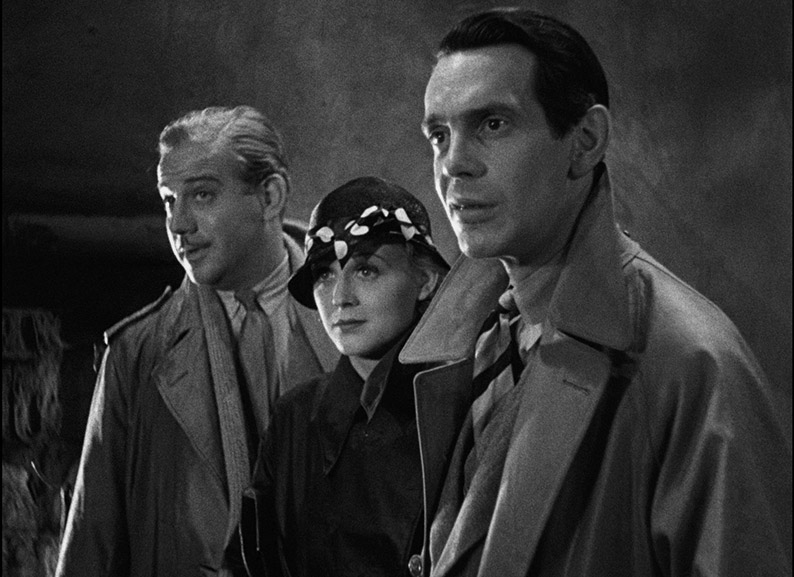
It all takes place during the course of a single stormy night in a remote corner of the Welsh mountains as imagined by Hollywood, through which Philip Waverton (Raymond Massey) and his wife Margaret (Gloria Stuart) are attempting to drive. The process is being hampered by terrible weather and the couple's constant bickering, which is being stoked by their friend Roger Penderel (Melvyn Douglas), who is curled up in the back seat and clearly finds their predicament and irritation amusing. With the road behind them cut off by a landslide, and the way ahead increasingly treacherous to navigate, they pull up at an old house they chance upon and ask its occupants for shelter for the night.
Ah yes, the occupants. The house, it transpires, is owned by the prissy Horace Femm (Ernest Thesiger) and his grumpy, half-deaf and devoutly religious sister Rebecca (Eva Moore). The door is answered, however, by their butler Morgan (Boris Karloff), a facially damaged and sinister-looking mute who, the visitors are handily cautioned by Horace, can be dangerous when drunk. Let's hope no-one lets him near alcohol, then. Dinner is served, but the meal is interrupted by the arrival of bluff Northern businessman Sir William Porterhouse (Charles Laughton, sporting his native Lancashire accent) and his lively chorus girl girlfriend Gladys DuCane (Lilian Bond), both of whom are also seeking refuge from the storm. But as the evening progresses, the visitors become aware that the house is harbouring a couple of dark secrets in the shape of two further members of the Femme clan, the ageing Sir Roderick (played by actress Elspeth Dudgeon) and mysterious Saul (Brember Wills), who for everybody's safety is kept firmly under lock and key.
If this sounds like an archetypal Creepy House movie, well that's because it literally is, the archetype of this particular subset of the horror genre and one that, like Tod Browning's Dracula and Whale's Frankenstein before it, effectively defined the codes and conventions of the sub-genre that it spawned. The Femme house is cavernous and genuinely uninviting, its owners colourfully eccentric, and its butler as menacing as any you're likely to encounter. The self-generated electric lighting is prone to sudden failure ("We make our own electric light here, and we are not very good at it"), but for some reason the lamp required to navigate the darkened hallways has been left in a part of the house into which Horace would rather not to venture. And with the only route out blocked by landslide and flood, the hapless visitors are trapped for the night with the eccentric Femmes and whatever the upstairs rooms may harbour.
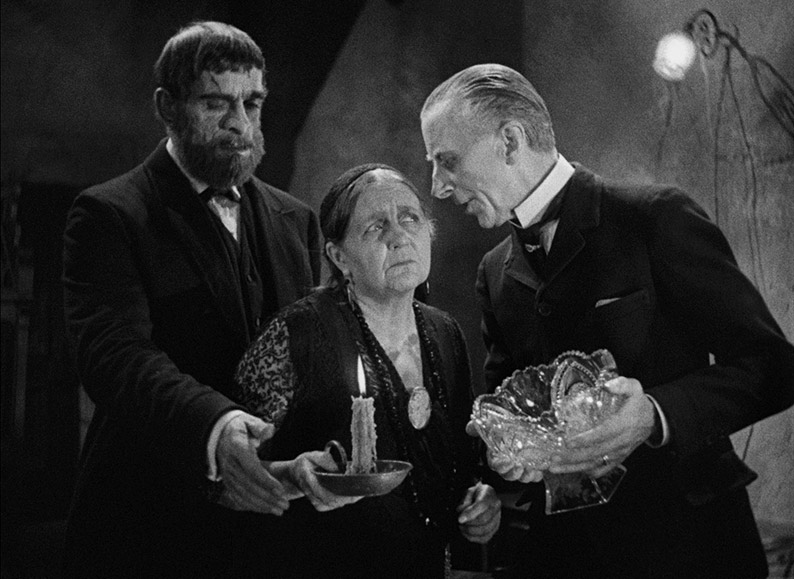
It all sounds very melodramatic and to a certain degree it is, but what continues to make The Old Dark House such a treat – quite apart from the wit and polish of its direction and performances – is its dark sense of humour and the feeling that we're being told more about the characters than what plays out on screen. Repeatedly we're handed titbits of information about the visitors and their reluctant hosts that we're slyly invited to expand on for ourselves. These range from questions about Roger's past history with Philip and Margaret and just why the three are travelling to Shrewsbury together (somewhere Roger clearly has no interest in visiting) to the nature of Morgan's relationship with Saul, someone Horace and Rebecca fear but for whom Morgan clearly has a deep affection. And it's never explained quite why Morgan becomes so obsessively drawn to Margaret, an instant attraction that foreshadows his role as Imhotep in The Mummy later that same year and is reflected in the lightning speed at which Penderel and Gladys fall for each other, going from polite introductions to making plans to live together in what feels like a few minutes.
The humour is all character-based and is on display from the start in the long-time-married bickering of Philip and Margaret, and in Roger's chirpy responses and his infuriating habit of turning every bit of bad news into a song. Once they enter the house, the baton is passed to the reluctant hosts in the shape of Rebecca's surly response to just about everything ("No beds! They can't have beds!") and Horace's camp twittering and sneering mocking of his sister's beliefs, a heartfelt piece of atheistic cynicism that, in film terms at least, feels years ahead of its time. Indeed, from this point on the film is owned by these two, as while the interplay between the visitors is engaging enough, just about everything Ernest Thesiger does as Horace has me squealing with delight on every viewing, from the casual manner in which he tosses his sister's flowers on the fire to free up a chair to the almost fearsome manner in which he directs Roger to his dinner table seat with a carving fork and his thrice repeated catch-phrase of "Have a potato." As Rebecca, Eva Moore amuses no end in her grumpy disdain, but unlike her cowardly bother (who scurries away to hide in his room when events take a threatening turn), she at times exudes a discomforting air of menacing madness. This first becomes apparent in the extraordinary scene in which Margaret changes out of her wet clothes and into an evening dress as Rebecca – whose face at one point is expressionistically framed as a series of distorted reflections – delivers a stern lecture on sin and the corruption of the flesh, which concludes when she places her hand on a startled Margaret's chest in manner that almost suggests she's passing on a morally-driven infection. Like Horace's mocking of his sister's religious beliefs, it's a scene that wouldn't have survived in this form a couple of years later when the Production Code put its censorial foot down.
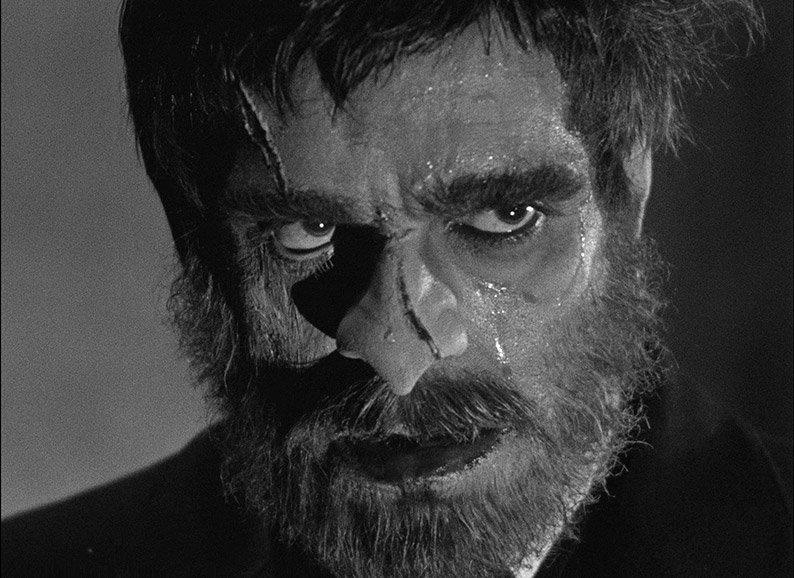
Although confined to a dialogue-free supporting role (for some peculiar reason, even his grunts have been looped by another actor), the headlined Boris Karloff still makes a considerable impression, from the "holy crap!" impact of his opening close-up to the genuine tenderness he displays for Saul in the story's later stages. And when he inevitably hits the bottle, there's a convincing roughhouse scrappiness to the efforts of the abled-bodied male visitors to subdue him and drag him to the confines of kitchen, from which he later escapes by kicking its door to pieces. And while we don't get to meet him until the last act, Brember Wills delights as Saul, wonderfully wrong-footing us about his true nature and... no, I risk getting into serious spoiler territory here.
Visually, the film has a strikingly gothic feel, with characters dwarfed by a cavernous main hall in which its occupants also relax and dine, from which a stairway snakes into spooky corridors and doors lead off into deliciously set-dressed bedrooms. Hats off to set designer Charles D. Hall and cinematographer Arthur Edison here (both of whom worked on Frankenstein but neither of whom receive an on-screen credit here), whose work really comes into its own when the electricity fails and the main room is bathed instead by the light from the flames of the large hearth fire, projecting the action onto the wall behind the diners as expressionistic shadows. It's perhaps typical of the film's knowing sense of humour that this is openly acknowledged when Margaret transforms this moody lighting into a shadow puppet theatre for her own amusement, then is given a jolt when the surly Rebecca's shadow appears to emerge from her own.
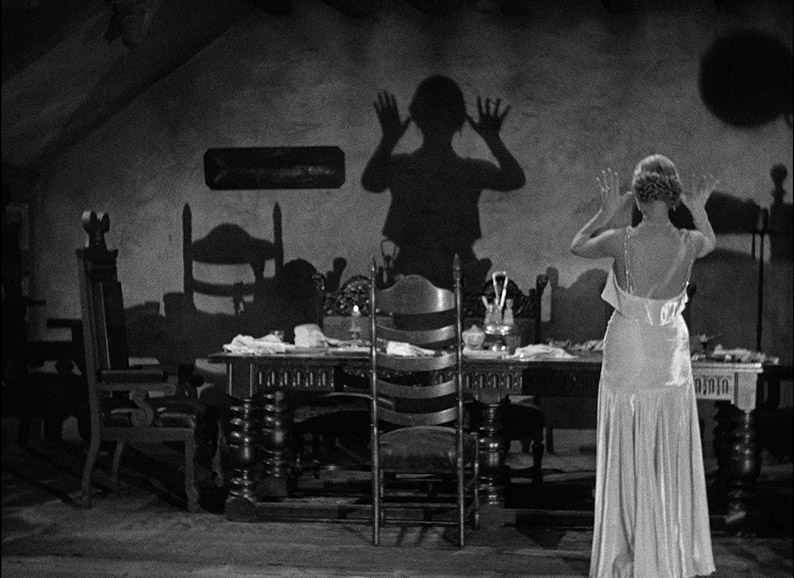
Tucked away in the special features on this disc is the suggestion that The Old Dark House is a film whose riches only really become apparent on a second or third viewing, and I'd absolutely second that. When I first saw the film in my teenage years, I remember enjoying it immensely, but was aware even then that it lacked the obvious hook of Whale's other genre works. Only when I returned to it in later years was I able to fully appreciate just how much is going on in this remarkable film, one in which almost every scene is packed with inventive treats, whose delightful cast of characters is varied and entertaining, and whose script is liberally littered with quotable lines. As a chiller it delivers, no question about it, but the thing I am struck by after every viewing (and there have been many) is just how much fun this wonderful film is.
| sound and vision – blu-ray |
|
When Kim Newman and Stephen Jones pine for a full-blown restoration of The Old Dark House on their commentary track (see below), I'm guessing the transfer here is what they were dreaming of. I too have only previously seen the film in the sort of ragged condition that we became used to when films of this vintage were screened on TV and was thus blown away but what I saw here. Sourced from a recent 4K restoration from Cohen Media Group, the 1080p HD transfer on this Blu-ray genuinely surpassed all my hopes and expectations. The restoration has genuinely de-aged the film, delivering a handsome tonal range and appropriately deep blacks, and revealing a level of picture information that I've just never seen before. As you would hope, the image has been stabilised and all damage and dirt has been cleaned away. A glorious job.
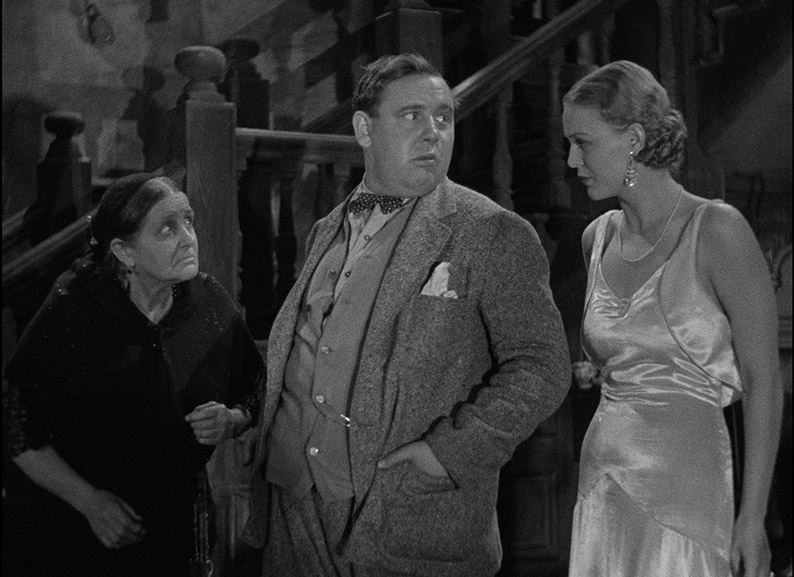
The Linear PCM 1.0 mono soundtrack has also been restored and is in fine shape. The restrictions in dynamic range are inevitable for a film made just a couple of years after synchronised soundtracks became a regular thing, but the dialogue is all admirably clear and there is no trace of damage of background crackle.
Optional English subtitles for the deaf and hearing impaired are available.
Seven years on from the label's Blu-ray release of The Old Dark House, Eureka has delivered this UHD edition, whose transfer appears to have been sourced from the same 4K restoration as its predecessor, confirmed by the Cohen Media logo that appears at the front end of both transfers. This new UHD was released on the same day as Eureka's UHD edition of Fred Zinnemann's High Noon, and I mention that not only because both discs are essentially 4K upgrades of already impressive Blu-ray editions, but also because the differences between the Blu-ray and UHD transfers are very similar with both titles.
As it is with High Noon, the transfer on the UHD of The Old Dark House is noticeably brighter than the one on the Blu-ray, with Dolby Vision HDR bringing out more visible detail in the shadows – of which there are many – whilst retaining the solidity of the black levels and avoiding any burnout of the highlights. Whether that image detail is significantly sherper and more clearly defined here is another matter. The quality of any such remaster is dependent in part on whether it was mastered from the original negative and the condition of the source material in question, and impressive though this 4K restoration is, The Old Dark House was at one point thought to be a lost film, and when stood against the benchmark likes of Eureka's Blu-ray releases of City Girl and M, the image doesn't have quite the same degree of pristine sharpness. There's no doubt that the UHD transfer feels crisper than its Blu-ray predecesssor, in part due to the more cleanely defined film grain, but when comparing specific details such as lacework on clothing or jewels on a pair of earings side-by-side with the Blu-ray, I couldn't see the same level of improved definition that I saw on the UHD of High Noon. It's still a very strong transfer, particularly for the HDR contrast grading, but in terms of sharpness not a giant leap over the already impressive Blu-ray.
The Linear PCM 1.0 mono audio track is every bit as strong as its Blu-ray equivalent, once again being sourced from the same restoration.
Optional English subtitles for the deaf and hearing impaired have once again been included.
All of the special features listed below appear on both the 2018 Blu-ray and the 2025 UHD. No new special features were added to the UHD.
Audio Commentary with Kim Newman and Stephen Jones
Sourced from an earlier DVD release (it's introduced up front as a DVD commentary, and at one point the two participants express their disappointment that the film has not undergone the sort of restoration featured on this disc), this energetically busy commentary from respected genre writers Kim Newman and Stephen Jones is a consistently enthralling and hugely entertaining treasure trove of facts, theories and opinions about a film that they both clearly adore. They cover so much ground and at such a breathless pace that it would take an age to even start listing the topics covered here, but I'll note that there is detailed information on all of the lead actors, open contempt for William Castle's "excruciating" 1963 remake, and a wonderfully on-the-nose comment that suggests the film is "in love with camp culture." A terrific extra.
Audio Commentary by Gloria Stewart
A very different but no less valuable commentary – also sourced from an earlier DVD – from the film's female lead, Gloria Stewart, who enthrallingly recalls details of the shoot and her fellow cast members. I was intrigued to learn that she was never invited to join what she labels 'the British contingent' in their regularly scheduled tea breaks (we don't do ourselves any favours, do we?), but that the cast all got on well regardless – indeed, the only actor she claims to have had trouble with in her entire film career is Claude Rains on Whale's The Invisible Man. There's also some interesting political titbits here – Stewart was one of the founding members of the Screen Actors' Guild, and Melvin Douglas's wife Helen later entered politics and stood against Richard Nixon, who responded by publicly slandering her. Can you imagine modern Republicans doing that? Oh, wait…
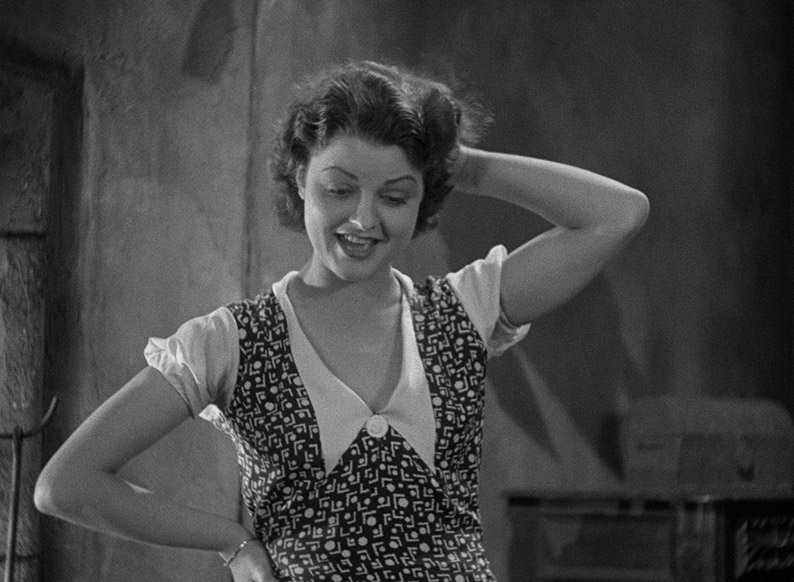
Audio Commentary by Jim Curtis
The third commentary is by James Whale biographer Jim Curtis and almost completely fact driven, with Curtis providing detailed biographies of all the main cast and crew members, though surprisingly this is the only extra feature that makes no mention of the fact that Eva Moore was once a leading light in the Suffragette movement. Comparisons are made between the book and the film (you'll find some of this in Newman and Jones's commentary too), and we also get information on dialogue that was censored in some American states on the film's initial release.
Meet the Femmes (37:58)
Another enthralling video essay by David Cairns, who rather neatly describes the film as "A very queer comedy disguised as a horror film." Much of the information on the actors and filmmakers is repeated elsewhere, but Cairns still delivers a few useful snippets that have been missed by others, and even reads out a few quotes from the book, as well as providing the expected intriguing analysis of several aspects of the film.
Daughter of Frankenstein (14:45)
Boris Karloff's daughter Sara is interviewed by Dean Otto, Curator of Film at the Speed Art Museum), and it's no surprise that she focuses on her father and his film career, including his relationship with makeup maestro Jack Pierce and his work on The Old Dark House.
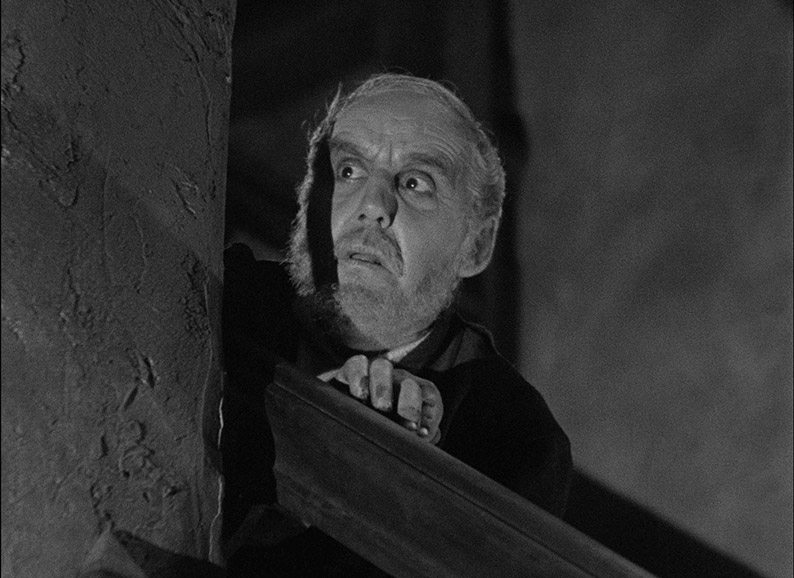
Curtis Harrington Saves The Old Dark House (7:00)
A standard definition interview framed 4:3 – likely sourced from an earlier DVD – with Night Tide and Whoever Slew Auntie Roo? director Curtis Harrington, who recalls how he first met and became friends with James Whale, and outlines his efforts to rescue The Old Dark House from obscurity and studio indifference.
2018 UK Re-Release Trailer (1:36)
A misleading trailer that sells the film as a straight horror film and gives no indication at all about how much fun it is, and is married to an inappropriate electronic score.
Stills Gallery
13 screens of publicity stills, all good quality.
One of those rare films that really does seem to get better with every viewing, The Old Dark House is more fun and more inventive than any of the later films in the sub-genre it spawned, and frankly more fun than any modern horror movie I've watched in some years. The Cohen restoration is a glorious thing for a film of this vintage and once near-lost status, with the film looking better than I could ever have hoped on the wonderful Masters of Cinema Blu-ray, and even nore impressive on the newer UHD, thanks to the wider contrast range fascilitated by the Dolby Vision HDR. Both discs are backed by the same set of quality special features, including three commentaries and a very fine booklet. If you've yet to pick this up on any format then the UHD is definitely the one to go for, but if you already have the Blu-ray then the decision on whether to upgrade will likely depend on your fondness for the film and the size of your screen (the bigger the TV, the more you're likely to benefit from the UHD upgrade). Either way, these are both highly recommended releases, with the UHD winning out for its improved HDR grading. |